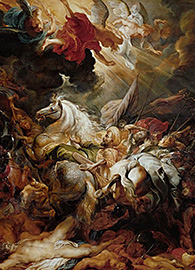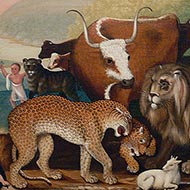Isaiah Week 4
Immanuel Revisited: Isaiah 9:1–12:6
By Bo Lim
Seattle Pacific University Associate Professor of Old Testament
Read this week’s Scripture: Isaiah 9:1–12:6
17:28

 Enlarge
Enlarge
“For the time comes of the Dominion of Men, and the Elder Kindred shall fade or depart …. The burden must lie now upon you and your kindred.” [Author’s Note 1] Thus the stage is set for the drama in Tolkien’s The Lord of the Rings; the fate of Middle-earth will rest in the race of men. Even the noble warrior Aragorn objects to this responsibility bestowed upon him, since he is but a mortal. Perhaps one should turn to the elves instead, since they possess immortality. But it will be humans, with all of their valor as well as vices, upon whom the destiny of Middle-earth rests.
As we have observed in previous lessons, in Jerusalem and its inhabitants lies the fate of the cosmos in the book of Isaiah. It is Jerusalem that functions as the nexus between heaven and earth. Like humans in The Lord of the Rings, Israel at times marvelously succeeds and on other occasions fails miserably. As Isaiah 2 has indicated, the time comes of the dominion of Israel. So it is no surprise that in Isaiah all eyes are on Jerusalem.
Yahweh’s Hand Is Outstretched Still
Once again it is the word of the LORD that performs the will of Yahweh. Earlier we have seen that is the word of the LORD that speaks judgment on Israel (1:2, 10, 20), yet also announces visions of hope (2:1, 3). In 9:8, we observe the divine word in action again, and in this case it condemns Israel as well as the Assyrians, yet offers the hope for a remnant.
Isaiah 9:8–21 is a word of judgment against Israel, not Judah. The mention of Israel (9:8, 11, 14), Ephraim (9:9, 21), Samaria (9:9), and Manasseh (9:21) indicates that here we are talking specifically about the Northern Kingdom (Israel) [Author’s Note 2]. Even though Isaiah prophesies solely in the Southern Kingdom (Judah), and his prophecy is focused on Jerusalem, he speaks at length about Judah’s sister kingdom, Israel. Later the prophet Jeremiah will remind the Judeans that they are to learn from observing the unfaithfulness of Israel and not follow in her destructive ways (Jeremiah 3:6–14).
Earlier, Isaiah 2:6–22 described how Yahweh is fundamentally at odds with the proud and lofty. Isaiah 9:9–10 describes how, out of its pride and arrogance, Israel believed it could patch up its brokenness with more expensive materials of dressed stones and cedar, but Yahweh reminds Israel that “his hand is stretched out still.” This phrase first appeared in 5:25 and occurs in 9:11, 16, and 20; and 10:4. In Chapters 10–11, it will be the hand of the LORD that acts in judgment (10:10, 13, 14) as well as salvation (11:11, 15). This image portrays Yahweh as a conquering warrior and emphasizes the systematic judgment Yahweh effects against his sinful people.
In 9:13–17, the greatest among them — the prophet, the elder, and the dignitary (Israel’s leadership) — are indicted for their sins, as well as the least among them — the young, the orphan, and the widow. Yahweh extends his outstretched hand of judgment on every Israelite, “because everyone was godless and an evildoer” (9:17). But Jerusalem and Judah must take heed of Israel’s example, because they are not exempt from Yahweh’s judgment. In 10:1–4, Isaiah addresses the people of Jerusalem and Judah, announcing that the Day of the LORD is coming upon them and that the same arm that is stretched out in judgment over Israel also judges them.
The difficult news for Israel to swallow is that the instrument in Yahweh’s outstretched hand is none other than Israel’s enemy Assyria (10:5). Isaiah announces that Assyria is the rod, or the club, by which God will unleash his anger on the “godless nation” Israel (10:6). The phrases in 10:6 to “take spoil” (liŝlōl ŝālāl) and “seize plunder” (lāḇōz baz) recall both the sign of Maher-shalal-hash-baz (“the spoil speeds, the plunder hastens”) in Isaiah 8:3–4 and Isaiah’s earlier announcement that Assyria would invade Israel, Syria, and, eventually, Judah (8:4, 7).
Yet Assyria is not content to be an instrument in God’s hands, and begins to boast that it is by the strength of its own hands (10:10, 13, 14) that it rules the earth. The cities mentioned in 10:8–9 correspond to Assyrian expansion in the late eighth century B.C.E. Calno fell to Tiglath-pileser III in 738, and Carchemish and Hamath to Sargon II in 717 and 720, respectively. Arpad was destroyed in both 738 and 720.
When the king of Assyria begins to boast and exalt himself — actions that we have already seen are completely at odds with the Holy One of Israel (compare 2:6–22) — God decides to judge Assyria as well. The language used in 10:12–19 foreshadows Chapters 36–38, which narrate the invasion of Jerusalem by Sennacherib, Rabshekah’s blasphemous boasts against Yahweh, and God’s deliverance of Zion. Assyria oversteps its role as God’s instrument by opposing Jerusalem, the elect city of God (10:12).
Isaiah employs the image of deforestation throughout to illustrate his judgment on Israel and the nations. In this case, creation is both harmed in judgment and redeemed in God’s salvation of Israel and the nations. As mentioned previously, Isaiah’s vision is cosmic in scope; therefore, there are ecological ramifications to Israel’s vocation as God’s people and God’s dealings with them.
While Israel may rely on increased cedar lumber to bolster its defenses (Isaiah 9:10), God is a mighty lumberjack:
Look, the Sovereign, the LORD of hosts, will lop the boughs with terrifying power; the tallest trees will be cut down, and the lofty will be brought low. He will hack down the thickets of the forest with an ax, and Lebanon with its majestic trees will fall (10:33–34).
More devastating than the logging, the deforestation will take place through a raging forest fire. During the dry summer months in the land of Israel, great brush and forest fires are a serious threat. In 9:18, Israel’s wickedness is depicted as a fire, and in the very next verse it is the LORD’s wrath that is a fire that burns both land and people. But, as the saying goes, “If you play with fire, you’re gonna get burned”: Assyria too will go up in smoke (10:16–19) when it attempts to exalt itself over the Holy One of Israel.
The hubris of Assyria, illustrated most poignantly in its military conquests, wreaked destruction not only upon people but also upon the land. The Assyrians would plunder not only a foreign nation’s human resources but their natural resources as well. Sargon II speaks of razing, destroying, and burning cities in his conquests. Assyria sinned through defacing not only humanity but also creation, and so they will meet the same fate.
One here thinks of Tolkien’s Middle-earth, where deforestation represents the loss of people and land. In his Unfinished Tales, it is the Númenórean’s lust for timber to supply their shipyards and Sauron’s war preparations that lead to the devastation of the forests. Like Isaiah, Tolkien imagines a world full of trees that has become “far and wide on either bank [of the river] a desert, treeless but untilled.” [Author’s Note 3] God judges Assyria not only for its crimes against humanity, but also for its crimes against creation.
The Peaceful Kingdom
The book of Isaiah chronicles the story of Israel from its beginning as a lush forest and vineyard to its demise as a desolate wilderness “overgrown with briers and thorns” (5:5–6). Thankfully, Isaiah is ultimately not a tragedy, since the latter half of the book will narrate how Yahweh transforms the wasteland of Israel back into a lush garden.
It is no wonder that Isaiah’s prophecy of a coming king in Isaiah 9:1–7 and 11:1–9 involves the transformation of the land, as well as the restoration of creation. While the vision is not focused on reforestation per se, the theme of trees continues to be present in the announcement that “[a] shoot shall come out from the stump of Jesse, and a branch shall grow out of his roots “ (11:1), and “[o]n that day the root of Jesse shall stand as a signal to the peoples” (11:10).
Earlier, in Chapters 7–8, the sign of Immanuel — the birth of a child — possessed a double edge, as it signified both God’s salvation and God’s judgment upon Israel. Whether the child was the prophet’s or Ahaz’s, it appears that a child was born to that generation and God both delivered Jerusalem from the Syro-Ephraimite coalition and later allowed Assyria to conquer Judah and encroach upon Jerusalem. Yet the Immanuel prophecy was not exhausted in these events. The vision of Isaiah extends beyond the time of the eighth-century prophet.
In 9:1–7, Isaiah prophesies of another child and son to be born on behalf of God’s people (9:6). Isaiah 9:1 picks up on the theme of gloom and darkness in 8:22. The story in Chapters 6–8 ends on an ominous note: “they will look to the earth, but will see only distress and darkness, the gloom of anguish; and they will be thrust into thick darkness” (8:22). The geographical territories mentioned in Isaiah 9:1 correspond to the sections of Israel annexed by Tiglath-pileser III beginning in 732 B.C.E. (compare 2 Kings 15:29), so this darkness appears associated with Assyrian domination.
Isaiah 9:1–2 acknowledges this period of darkness, but also announces its end. This righteous ruler possesses the executive authority and capability to liberate Israel from foreign oppressors and establish justice and righteousness eternally. This is a Messianic figure in the manner of 2 Samuel 7 and Psalm 2. “Wonderful Counselor, Mighty God, Everlasting Father, Prince of Peace” (9:6) are royal designations. He is the ultimate leader, who not only possesses the best plan, but can execute it. In addition to the language of “child” and “son” in 9:6, the announcement that this individual is “for us” (lānû) indicates that this figure is ‘immānû’el, “God with us” (7:14).
Earlier, Isaiah 6:13 provided hope that, even though God may cut down Israel, he would leave the holy seed as a stump to potentially sprout again and bring about new life. In Isaiah 11:1, it is the stump and roots of Jesse that will give rise to a Messianic shoot or branch. The mention of Jesse recalls David’s humble origins as a shepherd, the youngest brother, from the town of Bethlehem, who would go on to rule over all of Israel. Isaiah 11:1–9 announces that the Davidic Messiah will come and bring a kingdom of peace to the entire cosmos.
The famous American Quaker artist Edward Hicks (1780–1849) drew his inspiration for his Peaceable Kingdom paintings from Isaiah 11:6–9. What is fascinating is that Hicks imagines peace to be one of social, political, and ecological harmony. He depicts treaties between colonists and Native Americans, and images of wild animals living in harmony with children — in stark contrast to his other works illustrating the destructive forces of industrialization.
Isaiah 65:25, a text describing the new heavens and earth, also repeats the phrase, “[t]hey shall not hurt or destroy on all my holy mountain” (compare 11:9), and similarly describes the domestication of dangerous beasts of the field. The Messiah rules not only over human kingdoms, but over all creation, and his reign is not only on earth, but also in heaven.
The Great Homecoming
Isaiah 11:10–12:6 provides a fitting conclusion to Chapters 1–12. Isaiah provides several glimpses of Israel’s glorious future throughout these chapters, culminating in the prophecy of 11:1–16. Isaiah 2:1–4 speaks of the exaltation of Zion over the nations, and 4:2–6 describes the purification of Jerusalem. The focus in Isaiah 9:1–7 and 11:1–9 is on the Messiah, and his sovereignty over all the nations and creation. In 11:11–16, we read once again of the ingathering of the nations, presumably to Jerusalem, in a manner reminiscent of 2:1–4. Zion, or Jerusalem, is not explicitly mentioned as the destination of the pilgrimage in these verses.
But the reader naturally recalls the intertext of 2:1–4 — given Chapters 1–12 form a unit — and 12:1–6 explicitly celebrates the exaltation of Zion. Thus, Isaiah 1–12 provides the following hope for Israel: In the future, God will gather his dispersed remnant from among the nations in the manner of a new exodus, to dwell in a purified and glorified Jerusalem. The Messiah will rule from this place, destroy all evildoers, and bring harmony to all of creation. The nations will come peaceably in submission to Yahweh’s rule and instruction, and Zion will once more be the City of Righteousness and Faithfulness.
While certainly Israel will undergo judgment at the hands of the Assyrians, Israel will not be completely rejected. A remnant will survive, not merely by sheer luck or tenacity, but rather by faith. Isaiah 10:20 indicates that this remnant is characterized by its no longer leaning on Assyrian power but instead leaning on “the LORD, the Holy One of Israel, in truth.” Isaiah is no universalist, believing in the salvation of all persons regardless of their allegiances. It is only the fraction of the people of Israel who survive God’s judgment by faith who are allowed to return. The word remnant recalls the possibility of “a tenth part” remaining in 6:13, and, in 7:3, Shear-jashub (Isaiah’s son) means “a remnant shall return.”
In 11:11, this remnant returns not only from Assyria, but also from Israel’s other conventional enemies — Egypt, Babylon, Persia, and Damascus — as well as from the farthest corners of the earth, as indicated by the mention of “the coastlands of the sea.” The hostility between the Northern and Southern Kingdoms (11:13), which factored into the events of Chapters 7–8, will be no more and Israel will subdue their regional rivals (11:14). This great ingathering will come in the form of a new exodus, reminiscent of the first exodus out of Egypt (11:15), yet in this case the people will flee from Assyria as well.
In 11:10, the announcement of the Messiah is combined with the salvation announcement of a great homecoming. This new exodus will be led not by Moses but rather by the Messiah. The Messiah will be raised up as a signal for this ingathering. Chapter 12 ends the salvation message of Chapters 1–12 with a hymn of praise for God’s deliverance.
Throughout Scripture, a thanksgiving psalm follows an act of redemption. For example, Exodus 15, the great “Song of the Sea,” is sung in celebration of Yahweh’s victory over Pharaoh in Exodus 14. Isaiah is no exception; thus Chapter 12 is the proper response to the mighty acts of God described in Chapters 1–11. The psalm is one that will be sung by the remnant and the nations in that day when this prophecy is fulfilled. Yet, in the present, the people of God can sing this song as a means of comfort that provides them the hope to endure God’s judgment in the present (12:2).
Questions for Further Reflection
- Our text for this week draws attention to the relationship between creation and God’s judgment and salvation. What is the nature of this relationship? What are the implications for us today as we consider a theology of creation care and proper stewardship of the earth’s resources?
- Now that you have read up to Isaiah 11, who are possible candidates for Immanuel? If you had previously thought of the Immanuel prophecies as being exclusively Christ-centered, how has this shift impacted your understanding of Scripture?
- Israel imagined salvation to look like another exodus (10:20-27; 11:10-16). What are some images you use to portray salvation (inspired by Scripture or your imagination)? Spend some time in prayer and reflection, considering both the exodus imagery as well as others.
- Our reading for this week ends with a psalm (or song) of thanksgiving. Re-read Chapter 12. How might it have been a word of comfort or hope to the people of Israel at the time of Isaiah’s prophecy? How does it serve as a word of comfort or hope to you today?
<<Previous Lectio Back to Isaiah Next Lectio>>

This work is licensed under a Creative Commons License.






The Immanuel prophecy is divine speech. The prophecy was given to king Ahaz but was not for that time or for him. Divine speech and sealed with two signs. This prophecy was given only to the house of David and no one esle. It’s not a dual fulfillment and not a birth. This prophecy can only be unseal by the two sons given to Isaiah and these two signs are the two olive trees seen on Zechariah visions. What these two servants of God do is sealed from humanity and angels. No seer, sage, prophet, pope, priest, rabbi or pastor or angel in heaven can know what they do on earth.